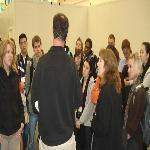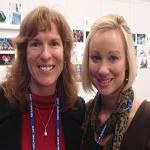
This is the 10th time Lisa Delpy Neirotti has accompanied college students to an Olympic Games. Neirotti is a professor for Sports Management at the George Washington University, and 28 students from the Business School are with her in Vancouver studying the management and marketing of the Olympic Games.
Through the years she has built up relationships with people connected to the Olympics to make these educational visits successful.
"We're meeting with people from IOC members all the way down to volunteers, including USOC, VANOC, sponsors from the top level to the national level, to suppliers," Neirotti said.
Professor Neirotti told VOA she meets with the students well in advance and warns them that the Olympic trips are not about fun and games.
"This is a rigorous course," she said. "The students are just dead tired. I mean we go from 8[am] to 5 or 6[pm], and then they're expected to go out and collect surveys. They collect a minimum of 50 surveys each of spectators."
And the students do that after their class time and their behind-the-scenes meetings and tours.
Neirotti says she also expects the students to attend sporting events, and they must purchase their own tickets.
"The students are on their own to find tickets, but I help them," she said. "I have some connections with all the different ticket agencies, not just from the United States but from all different countries. So at least I can point them in the right direction."
For obvious reasons it's an expensive college course to be enrolled in, says Neirotti. Students must not only pay the normal university course tuition, but they must cover the cost for airfare, local transportation, housing, food, tickets and, of course, souvenirs.
Professor Neirotti was able to find a youth hostel so the students pay a modest $40 a night compared to other lodging options. She said they don't spend much time there, so they don't need anything better.
"I actually have them sign a form saying you will be running, you will skip meals, you will not get [much] sleep," Neirotti said. "And, you know, they think I'm kind of joking when I have them sign this form. But when we're here it's in preparation for if they work a Games. I mean I know the staff of VANOC [Vancouver organizers] and media; they don't get much sleep when they're here because they're working."

Student Morgan Goerke confirms her professor's claims.
"She's not lying. I think I've eaten lunch once in the past week, and we literally run from one event to another, across traffic and through crowds and crowds, but it's very important that we make a good impression so we try to get there on time, and that sometimes involves running," she said.
The students are getting some journalistic experience as well, as they are writing an Internet blog at sportsfanlive.com.
Professor Neirotti says it's been well received.
"Thousands of people have come to the site to see the unique experiences that our students are experiencing here," she said.
Just like athletes and spectators have their special moments at an Olympics, Neirotti beamed when she told about her special moment in Vancouver.
"I was at the USA House the other day talking to somebody about our student group, and I went on after our discussion, and then he came back and he came over and shook my hand and said how impressed he was with what we were doing," she said. "And when he shook my hand, inside was $400, and he said I want you to take the students out for a good meal."
As for sightseeing, there's little time for that during their studies at the Olympics, but the students are welcome to stay for a bit on their own afterwards - if, of course, they are not worn out.
Vancouver Organizing Committee faces Olympic questions head on
Communities exhibit works to inspire Olympic visitors to return to British Columbia
Center rescues women only steps away from Olympic flame
Canada's native tribes showcased at Winter Olympics
(來(lái)源:VOA 編輯:陳丹妮)
